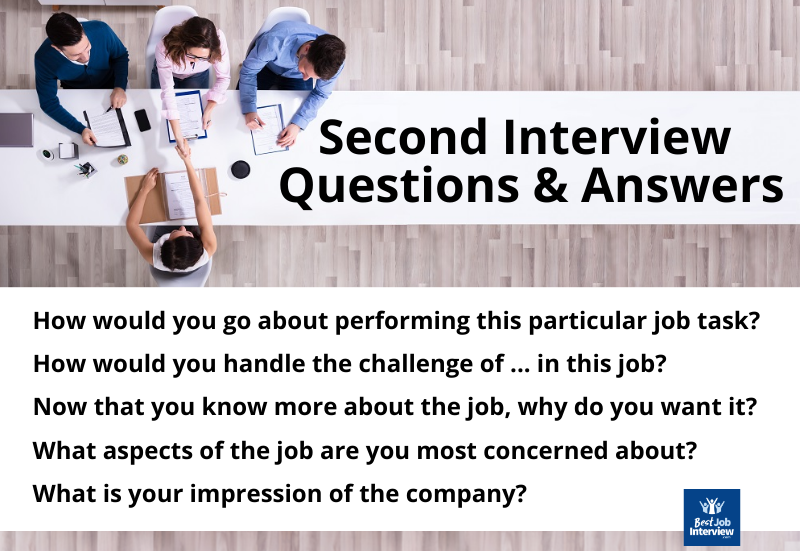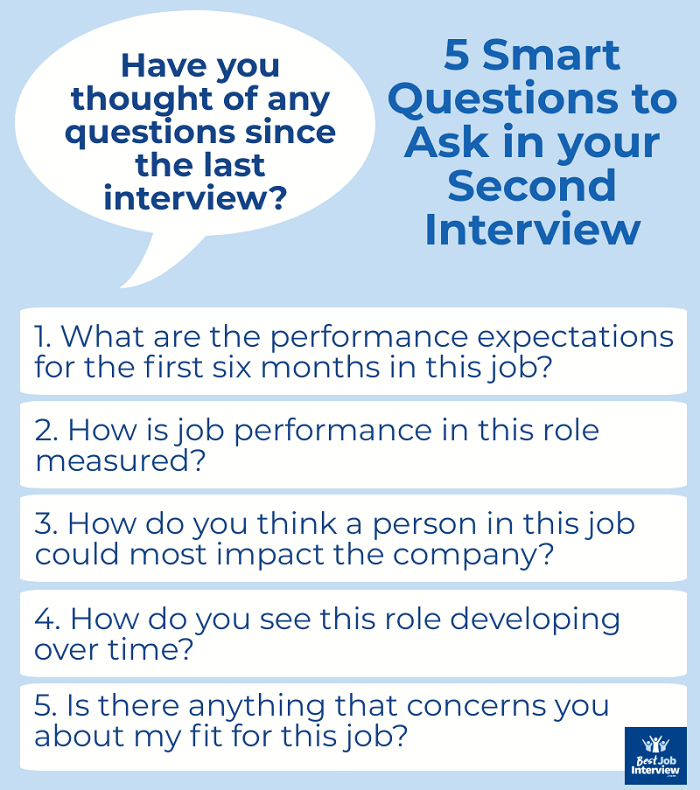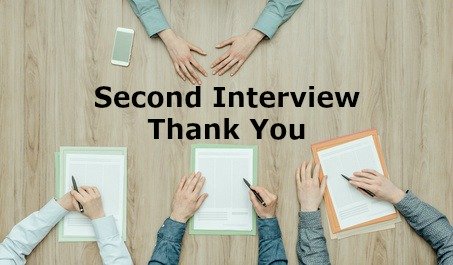Second interview questions differ from those you faced in your first interview.
The questions tend to move from the general to the specific. The questions become more technical and focus on your ability to successfully perform the job tasks.

The employer wants to determine the depth of your understanding of
the job and how you can transfer your existing skills and abilities to
meet the requirements of the job opportunity.
You can also expect interview questions that explore your fit with the company culture and organizational ethos.
Top Ten Second Interview Questions
You need to have a good knowledge of the technical and task aspects
of the position and anticipate second interview questions around these.
1. How would you go about performing this particular job task?
Be
sure you are familiar with job-related jargon and abbreviations.
These
will probably be used when asking job-specific interview questions. Draw
attention to those skills where you feel you have the advantage over
other candidates. Show how you have the necessary abilities to
successfully complete the job tasks.
2. ….. is the sort of challenge that this job can present. How would you handle it?
Refer to how you have successfully handled a similar challenge
previously. Behavioral questions are commonly asked during the second
interview. They will be used to assess competencies that are key to
specific job performance.
- think about your most impressive
accomplishments before your interview - make sure these examples are relevant to the key competencies or behaviors required for successful job performance.
- focus on measurable results
Get help with preparing for the behavioral interview questions you are likely to face at answers to behavioral questions
Second interview questions will also become more personal. They are trying to find out more about you as an individual. You have been evaluated on your ability to do the job, now the company wants to find out about your personality compatibility.
A major objective of the second interview is to determine how well you fit in with the company culture and if you are likely to get along with co-workers and management.
Expect questions such as:
3. What do you do in your spare time?
This second interview question may be phrased as “What outside activities are you involved in?”or “What do you do to relax?”
The potential employer is seeking evidence that you are a well-balanced person. Relate your answer to the competencies outlined in the job description.
Show how the right skills and competencies are reflected in the kind
of activities you enjoy. Do you enjoy a precise type of hobby such as
model building or do you prefer a risky, high-action type of activity
such as rock climbing?
You need to have an outlet to relax (other
than watching TV) and a constructive leisure activity indicates good
use of your spare time.
- try and tie the activity directly to job
performance - if the job demands close attention to detail focus on
leisure activities that demonstrate this behavior - if the job needs a team player highlight an activity where this is evident
Find out about the company culture
and the type of people they employ. You can use the company website and
social networking sites to do this.
They are looking for shared
interests and some common ground with their current employees so tailor
your answers to these personal second interview questions accordingly.
The
interviewers want to feel comfortable with you and have some level of
personal engagement but don’t make something up just to impress them as
this will backfire at some point!
Second interviews are used to
evaluate the candidate’s knowledge and understanding of the job and the
true level of enthusiasm and commitment for the job opportunity and the
company.
Expect second interview questions such as:
4. Now you know more about this job, why do you want it?
Highlight
your suitability and fit with the job.
- focus on areas where you feel
you have the edge over other candidates - point out the challenges and
opportunities that you are well prepared to meet
This is your
opportunity to clarify any areas of concern they may have about your
work ethic and your interest in the job.
5. What aspects of this job are you most concerned about?
Having
no concerns about the job opportunity shows that you have not given it a
lot of thought. This is not asking what you don’t like about the job
but what you would like to discuss further.
Talk about aspects such as training and coaching and performance measurement rather than the actual job tasks.
6. What is your impression of the company?
Be specific in your answer. Highlight a couple of positive aspects that you have learned about the company.
This question may be asked near the beginning of the second interview or at the end.
7. Have you thought of any questions since the last interview?
Have a couple of prepared questions ready, such as:
“What are the key performance expectations for the first six months in this job?”

Not having any questions will indicate that you haven’t spent time
considering the job since the first interview. Go to this good list of questions to ask to get help with preparing your second interview questions.
8. What salary are you looking for?
The
salary question may well come up in the second interview. Do not raise
it yourself but wait for the employer to bring it up. Don’t get caught
unawares and be prepared with a response.
Go to difficult interview questions to find out how to successfully handle questions about your compensation expectations.
9. If you were offered the job when could you start?
This
is a question that is often asked at the end of the interview. It is
not a job offer but an investigation of your real commitment to the job
opportunity. It is advisable to give a more general answer rather than a
specific date,
“I will be ready to start a week after/ immediately/ two weeks from when the final job offer is made”.
Avoid promising an unrealistic start date.
You may be asked the question “What other job opportunities are you considering?” in your second interview. View some appropriate responses to this question.
Since you are meeting with new people you can expect some of the same common interview questions you faced initially including:
10. Why should we hire you?
Now
that you know more about the job you can make your answer really
relevant and pertinent. Use this as a great opportunity to sell
yourself. Focus on your fit with the job. Get help at Why Should We Hire You?
Top Second Interview Tips
Find out how to prepare for a second interview and how to make the best impression using these second interview tips
Second interviews are often panel interviews. Use the helpful panel interview tips to make the right impression.
Before your second interview
Find out how to properly respond to the invitation to come back for a second interview.
Second Interview Acceptance Email Sample
After Your Second Interview

Always follow up on your interview in a professional and proactive manner. Use this second interview thank you letter to help you.
Readers also liked…
Second interview questions can be challenging. Find out how to be ready for any question you may have to face in a second job interview.
To Top of Page






